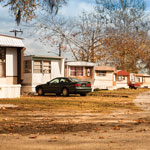 There are 900 manufactured housing parks — “trailer parks” — in Minnesota, in almost all 87 counties. Around 180,000-200,000 Minnesotans live in manufactured housing. Leases in parks work very differently than tenancy in apartment buildings. Park residency is not at-will. If a resident’s lease ends, they can decline to sign a new lease and continue to rent the lot their manufactured home sits on until the park owner has one (of eight) predetermined “good causes” to evict.
There are 900 manufactured housing parks — “trailer parks” — in Minnesota, in almost all 87 counties. Around 180,000-200,000 Minnesotans live in manufactured housing. Leases in parks work very differently than tenancy in apartment buildings. Park residency is not at-will. If a resident’s lease ends, they can decline to sign a new lease and continue to rent the lot their manufactured home sits on until the park owner has one (of eight) predetermined “good causes” to evict.
“There are people who are being led to believe the eviction process is just the park owner telling you they want you out,” says Dave Anderson, the executive director of All Parks Alliance for Change. What many residents don’t know is that only the courts can evict them. This is where All Parks Alliance for Change (APAC) — a Minnesota State Bar Foundation grant recipient since 2005 —comes in. APAC hosts workshops and meetings, assists attorneys in their cases involving manufactured home residents, and lobbies local and state governments.
APAC was founded in 1980 under the name Anoka People’s Alliance for Change. It was conceived as a means of assisting low- to moderate-income residents in Anoka County with a broad set of concerns such as access to healthcare, wage discrepancies, and more. After a few years, it became clear that there was little attention paid to people residing in manufactured home parks. When housing policy changes were proposed at the local or state level, these changes did not apply to people who rented or owned mobile or manufactured homes. In fact, mobile home parks were often specifically excluded in these policies.
APAC worked to establish foundational legal protections, collaborating with legislators to establish rules requiring park owners to provide leases to residents and offering protections against retaliation. “Park residents should have the basic rights that other renters have,” says Anderson.
The organization adopted its current name, All Parks Alliance for Change, and went metro-wide in 1989, moving its office from Fridley to St. Paul. In 1994, they changed the bylaws and mission statement to reflect their broader representation of residents throughout the state.
In the late ‘80s, parks began closing, and organizations started putting pressure on communities catering to low-income residents. Because of this, APAC added another layer to their organization, responding to the redevelopment of parks and pushing for a specific closure process. Before they tackled this issue, a park owner could close a park simply by giving everyone in the park a 60-day eviction notice.
APAC lobbied for a policy that provides relocation benefits, and as of 2019, parks must provide 12 months minimum notice if they are closing; make contributions to the cost of relocation; indicate where in a 50-mile radius a manufactured home could move and what the rental costs are; and offer a right of first refusal, which includes an option for residents to purchase the park.
One attempt to exercise the right of first refusal that received a lot of media attention involved the community of Lowry Grove in St. Anthony Village. As it turned out, the state law was riddled with unforeseen issues, including many vague provisions that made the law hard to use as well as loopholes that allowed park owners to avoid complying with the law. Even though residents came up with the required $6 million asking price within the stipulated 45 days, a judge found that when the park owner sold to a developer instead, the residents had no recourse. All Parks Alliance for Change backed a top-to-bottom cleanup of that law, which now allows the purchase right to work as intended.
APAC has also moved beyond its defensive posture, advocating for proactive, concrete measures to ensure that residents are being protected in the same way as owners or renters of other kinds of residential property. Today APAC has multiple ongoing projects, many of which involve legal rights and quality of life issues. They are currently putting together their agenda for the 2020 legislative session, including proposals to use alternative dispute resolution to allow residents to better address operational problems, and to recognize residents as property owners entitled to receive notifications about health and safety code violations that now only go to the landowner.
Recently there has been an increase in the consolidation of ownership of manufactured home parks in national chains, one of which is Havenpark Capital, a new company that has received negative press over leases they’ve attempted to foist on residents. “These big chains are either ignorant of or ignoring the state law,” said Anderson.
APAC relies on volunteer attorneys for information and representation of its clients. When a client calls APAC’s hotline, they are assisted in the self-advocacy process through conciliation court, referred to an attorney, or referred to HOME Line, Housing Justice Center, or Legal Aid.
To volunteer with APAC, or for further information, please contact Dave Anderson, executive director, at dave@allparksallianceforchange.org.
Athena Hollins is the MSBA’s senior director of diversity and foundations.
Amanda Idinge is the MSBA’s foundations coordinator.
The Minnesota State Bar Foundation was created in 1932 as the charitable arm of the MSBA. It provides monetary grants to community and law-related programming. You can contribute to the MSBF at www.mnbar.org/donateMSBF